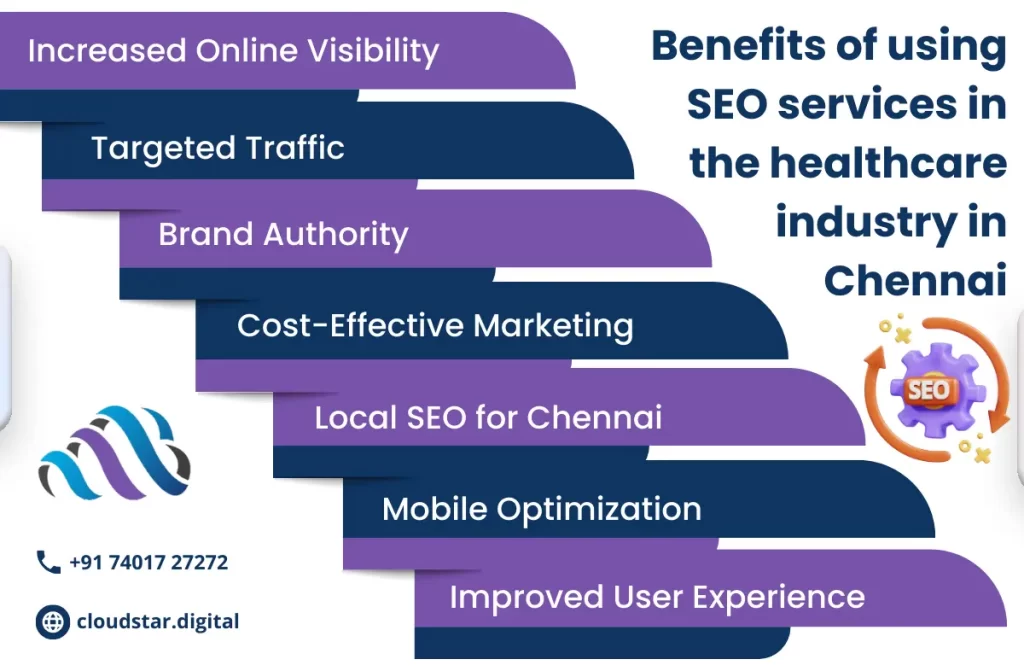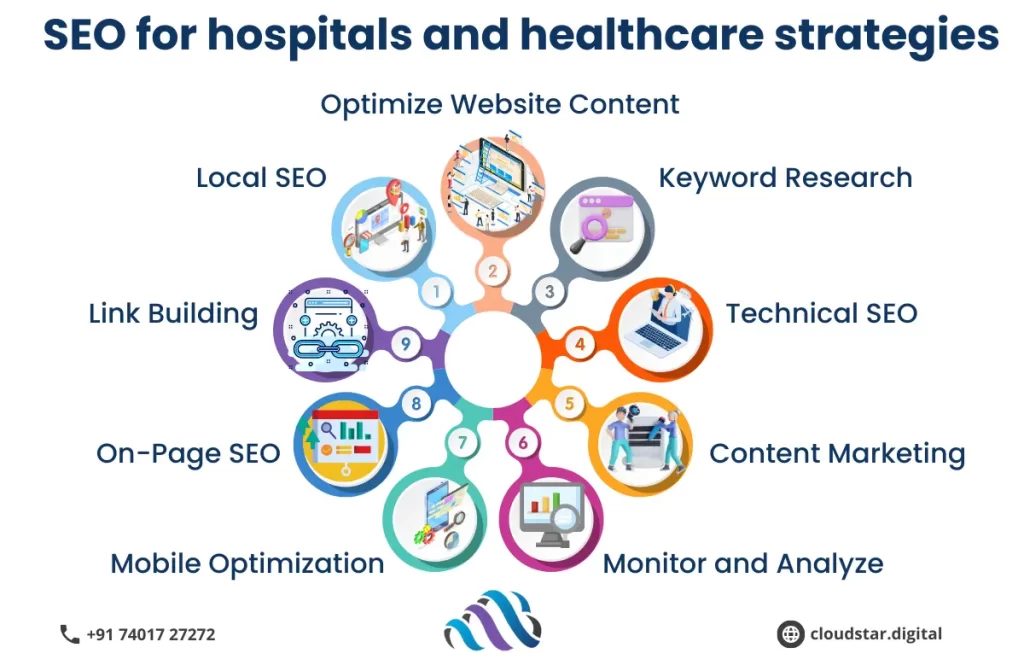In today’s digital age, where information is readily available at our fingertips, it’s no surprise that healthcare providers are turning to specialized Healthcare SEO service in Chennai to enhance their online presence. The internet has become a primary source of information for individuals seeking healthcare services, making it imperative for healthcare facilities in Chennai to leverage these SEO strategies.
What is Healthcare SEO?
Healthcare SEO refers to the process of optimizing a medical website to increase its visibility on search engines like Google. This involves a variety of techniques including keyword research, content creation, and link building, all aimed at improving the website’s ranking. By implementing healthcare SEO service in Chennai, medical professionals can attract more patients, improve their online reputation, and ultimately grow their practice.

What are Healthcare SEO Services?
Healthcare SEO services involve optimizing medical websites to improve their visibility in search engine results. This specialized SEO caters to healthcare-related queries, incorporating medical keywords, location-based terms, and patient-centric content.
1. It ensures compliance with healthcare regulations like HIPAA while optimizing metadata, website structure, and content.
2. Additionally, healthcare SEO emphasizes local search optimization, encouraging patient reviews, and enhancing mobile responsiveness for an intuitive user experience.
3. By implementing strategic link building, keyword analysis, and content creation, healthcare SEO services aim to drive organic traffic, boost online visibility, and ultimately connect patients with reliable medical information and services.
What You Can Expect with Our Healthcare SEO Services
In today’s digital landscape, having a strong online presence is crucial for healthcare providers. Our Healthcare SEO Services in Chennai are designed to help doctors, clinics, and hospitals improve their online visibility, attract more patients, and enhance their credibility.
With our expert SEO strategies, you can expect:
- Higher Search Engine Rankings: We optimize your website with relevant medical keywords, ensuring that your practice appears at the top of search engine results.
- Increased Website Traffic: By improving your search visibility, we drive more targeted traffic to your website, increasing patient inquiries and appointments.
- Improved Local SEO Performance: Our SEO for doctors focuses on local search optimization so that your practice appears in Google’s local pack, maps, and organic search results.
- Enhanced Online Reputation: Our Healthcare SEO Services in Chennai help establish your authority in the healthcare industry, building trust among potential patients.
- Higher Conversion Rates: By optimizing your website’s design and content, we turn visitors into patients, boosting your revenue.
What Services Do We Provide Under Our Healthcare SEO?
As the best SEO company for doctors, we offer a comprehensive range of services tailored specifically to the healthcare industry. Our Healthcare SEO Services in Chennai include:
1. Keyword Research & Strategy
We conduct in-depth research to identify high-traffic medical keywords, including SEO for doctors, to ensure your website ranks for the most relevant terms that potential patients are searching for.
2. On-Page SEO Optimization
We optimize your website’s meta tags, headings, URLs, and content to ensure search engines can easily understand and rank your site.
3. Local SEO for Doctors
- Google My Business (GMB) optimization
- Local citation building
- Location-based keyword targeting
- Reviews and ratings management
4. Technical SEO Improvements
- Mobile-friendly website optimization
- Website speed enhancements
- Secure HTTPS implementation
- Schema markup for rich snippets
5. Content Marketing for Healthcare
- Blog writing on medical topics
- Patient education articles
- FAQs and service pages
- Press releases and case studies
6. Link Building & Off-Page SEO
We acquire high-quality backlinks from medical directories, authoritative healthcare blogs, and relevant industry websites to strengthen your website’s authority.
7.Social Media & Reputation Management
- Managing online reviews
- Improving doctor-patient engagement on social platforms
- Promoting healthcare services through social media SEO strategies
Cultivating Digital Wellness Maximizing Healthcare SEO Service in Chennai
Power of Digital Presence
In Chennai, as in many other cities, the healthcare industry is fiercely competitive. With numerous hospitals, clinics, and medical practitioners vying for the attention of potential patients, having a robust digital presence is essential.
- A well-optimized website is the foundation of this digital presence.
- Hospital SEO services can help healthcare providers create a website that not only looks professional but also ranks high in search engine results.
Local SEO for Chennai Healthcare Providers
Local SEO is a crucial aspect of healthcare marketing. People often search for healthcare services near their location, making it vital for healthcare providers to appear prominently in local searches.
- Healthcare SEO service in Chennai can optimize your website for local search terms, ensuring that your facility appears in the Google Local Pack and other relevant local listings.
Content is King in Healthcare SEO
Quality content is the cornerstone of effective SEO for healthcare providers. Chennai residents seek valuable healthcare information online, from understanding medical conditions to finding the right doctors.
- SEO services can help you create informative, engaging, and medically accurate content that not only educates but also attracts and retains potential patients.
Expanding Reach through Social Media
Social media marketing platforms have become powerful tools for healthcare providers to connect with their target audience. Healthcare SEO service in Chennai can integrate social media optimization into your strategy, enabling you to reach a wider audience, engage with patients, and share valuable healthcare insights.
Cloudstar Digital Healthcare SEO Services
- Keyword Optimization: Enhance search engine rankings with targeted keywords for healthcare services.
- Content Creation: Develop compelling, SEO-friendly content tailored to healthcare industry trends.
- Link Building: Increase domain authority and referral traffic through strategic link acquisition.
- Local SEO: Optimize local listings and citations to attract nearby patients.
- Technical SEO: Improve site structure, load speed, and mobile responsiveness for better user experience.
- Analytics & Reporting: Monitor SEO performance with detailed analytics and customized reporting.
- Competitor Analysis: Identify SEO opportunities by analyzing competitor strategies.
- Conversion Rate Optimization (CRO): Enhance website usability to convert visitors into patients.
- Social Media Integration: Leverage social platforms to amplify SEO efforts and engage with patients.
- Continuous Optimization: Regular updates and adjustments based on SEO best practices and algorithm changes.
Challenges Faced by Healthcare Providers in SEO
Despite the advantages of Healthcare SEO Services in Chennai, healthcare providers often face unique challenges when trying to establish an online presence. As a trusted SEO company for doctors, we help you overcome these obstacles, including:
1. Strict Medical SEO Guidelines
Google’s algorithm and guidelines for healthcare websites are stricter than for other industries. We ensure compliance with E-A-T (Expertise, Authority, Trustworthiness) guidelines to build credibility and trust.
2. High Competition in Local Searches
Many doctors and hospitals compete for the same keywords. Our tailored Healthcare SEO Services in Chennai ensure your practice stands out and ranks above your competitors.
3. Managing Online Reviews
Online reputation is crucial in the healthcare industry. Negative reviews can impact your credibility. We help you manage and improve your online reputation by encouraging positive patient feedback and handling negative reviews professionally.
4. Keeping Up with Algorithm Changes
Google frequently updates its search algorithms. Our SEO specialists stay ahead of trends and algorithm changes to ensure your website maintains its ranking and visibility.
5. Lack of Time for Digital Marketing
Healthcare professionals have busy schedules, making it difficult to focus on digital marketing. As the best SEO company for doctors, we take care of all your SEO needs so you can focus on providing quality patient care.
Effective Healthcare SEO Strategies
- Local SEO: Optimize for local search to attract patients from specific geographic areas.
- Mobile Optimization: Ensure the website is mobile-friendly to accommodate users on smartphones and tablets.
- Technical SEO: Address site speed, security, and structured data for better rankings.
- Content Optimization: Focus on creating high-quality, authoritative content that addresses patient needs and questions.
- Link Building: Earn backlinks from reputable sites within the healthcare industry to boost site authority.
These targeted SEO strategies and services are designed to not only improve the online presence of hospitals and healthcare providers but also to ensure they remain competitive and relevant in an increasingly digital marketplace.

Benefits of SEO in Healthcare
- Increased Patient Acquisition: Improved visibility and rankings lead to more website visitors and, subsequently, more patient bookings.
- Greater Engagement: Effective SEO strategies lead to higher engagement rates as patients spend more time accessing useful content and resources.
- Enhanced Reputation: Being visible and ranking well on search engines helps enhance the overall reputation and perceived trustworthiness of the healthcare provider.
In conclusion, SEO is a fundamental component of digital marketing for hospitals and healthcare providers. It not only helps in attracting more patients by enhancing online visibility but also plays a critical role in educating them and building trust.
Conclusion
Leveraging the potential of healthcare SEO service in Chennai, such as those offered by Cloudstar Digital, is not just an option; it’s a necessity. A well-optimized digital presence empowers healthcare providers to connect with patients and thrive in the digital age. Embracing SEO, with expert guidance, becomes an investment in both marketing and the community’s health and well-being.
Read also: Content Marketing in Healthcare Promotion


